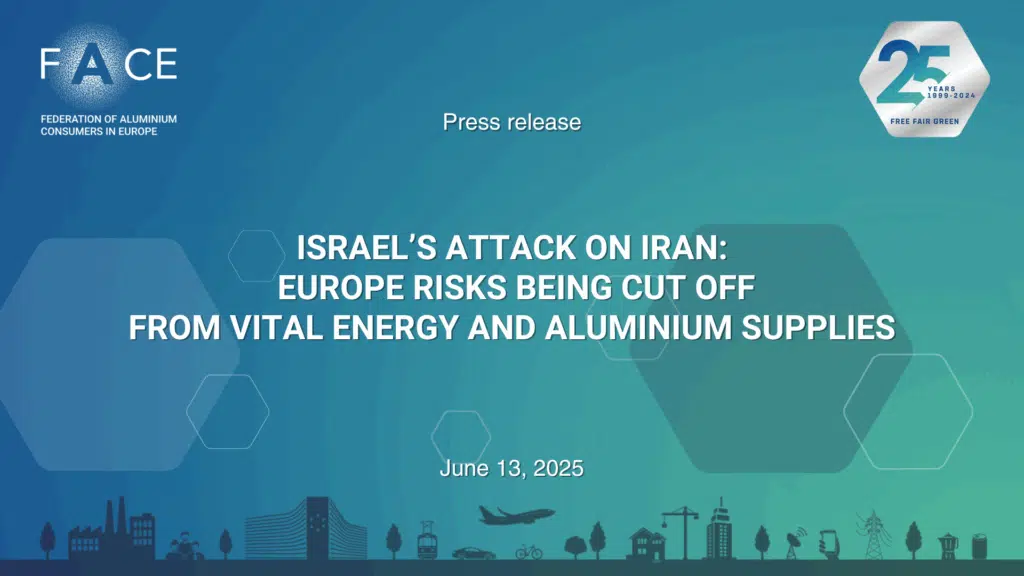PRESS RELEASE – for immediate release
Federation of Aluminium Consumers in Europe – FACE
Friday 13 June 2025, Brussels
PRESS RELEASE
ISRAEL’S ATTACK ON IRAN:
EUROPE RISKS BEING CUT OFF FROM VITAL ENERGY AND ALUMINIUM SUPPLIES
“The major escalation tonight with dozens of Israeli strikes on Iran can lead to an uncontrolled chain of events that could become existential for the EU’s aluminium industry”, warns Mario Conserva, co-founder and Secretary General of FACE, the Federation of Aluminium Consumers in Europe.
One cannot exclude that the Ormuz Strait may be affected by a spiralling new conflict or by a disruptive accident. In such a nightmare scenario, Europe could be cut off from vital energy and aluminium supplies.
The consequences would be devastating: a brutal amplification of an already crushing economic crisis, panic in the markets, massive industrial disruptions and destruction, social unrest and political destabilisation.
The European aluminium industry’s supply chain has never been so vulnerable : we run a growing primary aluminium deficit, now above 87% of our needs, we must annually attract 7 million tons of raw aluminium, we risk now an outflow of scrap to the US as this strategic raw material is exempted from Trump’s 50% tariffs ; finally, restrictions recently put in place in the context of the war in Ukraine further limit EU’s supply options and make us totally dependent on long, polluting, costly and risky maritime routes.
This systemic risk on the EU’s supply chain includes all circularity scenarii: first, because primary aluminium must be blended with secondary metal or used exclusively, for most applications, so even in the most ambitious recycling scenario, our needs for primary aluminium will continue to grow; and secondly, because the new U.S. tariffs on aluminium but not scrap will exacerbate both the outflow of scrap from Europe and a crisis within the recycling business: all in all, the EU will be increasingly unable to meet its needs of primary and secondary aluminium.
US-EU tensions may rise as the trade war can expand to the digital, agricultural and healthcare spheres. In parallel, the Trump administration continues to state its willingness to control Greenland and to coerce Canada.
The global war for critical minerals also includes Africa, where the US government is deploying an assertive strategy to counter China’s grip on African resources and infrastructures – and in this battle the EU is in a weaker position as ever.
“There are currently 120 armed conflicts globally. If we look at the new transactional world 360 degrees, we see that now the EU finds itself with no more secure international partnerships and trade flows. In the aluminium sector particularly, adds Conserva, there is no such thing as strategic autonomy for the European Union, but rather a growing strategic dependence in the foreseeable future”.
Against this backdrop, the intensified insecurity of the southern maritime routes in the Indo-Pacific, in the Gulf, in the Red Sea and around Western Africa, as well as potential transatlantic crises including around the Groenland and Canada, puts Europe in a raw aluminium supply chain vulnerability and risk that is unprecedented since World War II.
In the past two years our association has constantly warned on the perils associated with all forms and risks of restrictions of our vital supplies of primary aluminium, including the risks associated with the southern maritime routes and new geopolitical tensions.
The EU is increasingly in competition with other markets, and notably, now, with the USA, for supplies of critical minerals and strategic raw materials such as aluminium. We are fighting this fight in a position of geopolitical weakness and of major vulnerabilities, starting with our lack of natural resources, fragmented alliances and total dependence on maritime routes.
“The new Israël-Iran war – Conserva stresses – is a stark reminder that for its economic security the EU must keep all its aluminium supply options open”.
The press release in English is available here.
The press release in Italian is available here.
The press release in German is available here.
